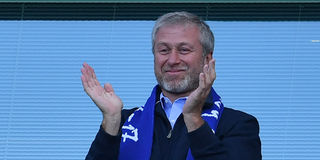Russia-Ukraine war offers our clubs key lessons on ownership

In this file photo taken on May 21, 2017 Chelsea's Russian owner Roman Abramovich applauds, as players celebrate their league title win at the end of their Premier League football match against Sunderland at Stamford Bridge in London. Chelsea have announced, February 26, that Roman Abramovich will hand over control to the club's foundation trustees.
What you need to know:
- The Vladmir Putin-instigated conflict has also set off a humanitarian crisis of immense proportions in Ukraine with a massive domino effect in the world economy
- The world is feeling the heat of another global crisis, just when the effects of Covid-19 had started easing
- One English publication this week reported that the sanctions imposed on Abramovich by the UK government have plunged the Stamford Bridge outfit into a state of crisis with US brokers Raine now overseeing the club's sale
Who would have ever imagined that an invasion by one country on a neighbouring nation would result in skyrocketing costs of living in many other nations, thousands of miles across the globe? And who would have ever thought that a war in one part of the world would trigger a hurried public ‘auctioning’ of a super rich football club elsewhere in the world?
Well, in a very short time span, the ongoing Russia-Ukraine conflict has achieved all that, and many more. The Vladmir Putin-instigated conflict has also set off a humanitarian crisis of immense proportions in Ukraine with a massive domino effect in the world economy. Since the invasion started, there have been mass displacements of both Ukrainian citizens and foreigners, Kenyans included. The world is feeling the heat of another global crisis, just when the effects of Covid-19 had started easing.
Sadly, we don’t know for long Putin will continue holding Ukraine and the global economy in his tight chokehold. What we know is that with each passing day, this conflict is not only shaping global geopolitics and international relations between pro and anti-Russia nations. Russia is gradually becoming a pariah, with Russian personalities perceived to hold close ties with President Putin, equally bearing the brunt of the international community.
This explains the situation in which Chelsea Football Club, who are the reigning European and World champions, have found themselves in, all thanks to their Russian oligarch owner, Roman Abramovich, the very man credited for transforming the club into the formidable force that it is today in just under two decades.
These are certainly not the happiest times for the West London club. One English publication this week reported that the sanctions imposed on Abramovich by the UK government have plunged the Stamford Bridge outfit into a state of crisis with US brokers Raine now overseeing the club's sale.
According to the publication, there is a feeling that whoever purchases the troubled club– and there has been no short supply of suitors – will have to cut down the club’s budgets, transfer targets and other spendings.
On top of that, the club still has to figure out how it will repay the £1.5billion (Sh226.5 billion) debt owed to Abramovich once the club ownership changes hands.
There are many ways of looking at and interpreting the way Abramovich has been strong-armed into relinquishing the ownership of Chelsea. Whether it is the right way or not is totally a different matter altogether. But the Abramovich-Chelsea saga has certainly raised serious questions about the sustainability of the oligarch-Arab merchants model of club ownership which is fast taking root at the highest level of the game.
Fortunately, or unfortunately, locally, this model is yet to catch on, although Congolese national Elly Kalekwa aka Prezda and Swedish businessman Ricardo Badoer have tried going that route with Sofapaka FC and Wazito FC respectively.
While Sofapaka, since being crowned Kenyan champions in 2009, have become perennial title contenders, Badoer’s only meaningful contribution at Wazito has been a ridiculously high player and coaching staff turnover – oh, yes and a flashy team bus!
Here in Kenya, we seem to be still split between community and corporate club ownership. While innumerable great clubs, previously owned by local blue chip companies, have long been disbanded by their previous benefactors, community ownership, on the other hand, has confined the likes of Gor Mahia and AFC Leopards to eternal poverty.




